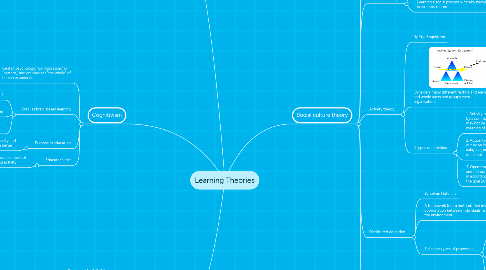
1. Behaviourism
1.1. Developed by B. F. Skinner
1.2. 3 basic assumptions
1.2.1. Learning is manifested by a change in behaviour
1.2.2. Environment shapes behaviour
1.2.3. Principle of contiguity & reinforcement
1.3. Learning is an acquisition of new behaviour through conditioning
1.3.1. Classical conditioning
1.3.1.1. Pavlov's dog experiment
1.3.2. Operant conditioning
1.3.2.1. Reward or punishment
1.4. Purpose in education
1.4.1. Produce behavioural change in desired direction
1.5. Educator's role
1.5.1. Arranges environment to elicit desired response
2. Social culture theory
2.1. Vygotsky's ZPD
2.1.1. Zone of Proximal Development
2.1.2. The distance between the actual developmental level as determined by independent problem solving and the level of potential development as determined through problem solving under adult guidance, or in collaboration with more capable peers
2.2. Situated learning
2.2.1. Proposed by Jean Lave and Etienne Wenger
2.2.2. Learning a social process whereby knowledge is co-constructed
2.2.2.1. picture
2.3. Activity theory
2.3.1. By Yrjö Engeström
2.3.2. Considers many different factors and elements and whole users and groups even organisations
2.3.3. 3 types of activities
2.3.3.1. 1. Activity towards an objective (goal) carried out by a community. A result of a motive (need) that may not be conscious social and personal meaning of activity (Answers the Why? question)
2.3.3.2. 2. Action towards a specific goal (conscious), carried out by an individual or a group possible goals and subgoals, critical goals (Answers the What? question)
2.3.3.3. 3. Operation structure of activity typically automated and not conscious concrete way of executing an action in according with the specific conditions surrounding the goal (Answers the How? question)
2.4. Distributed cognition
2.4.1. By Edwin Hutchins
2.4.2. A framework (not a method) that involves the coordination between individuals, artifacts and the environment
2.4.3. 3 distinct types of processes
2.4.3.1. 1. Cognitive processes may be distributed across the members of a social group
2.4.3.2. 2. Cognitive processes may be distributed in the sense that the operation of the cognitive system involves coordination between internal and external (material or environmental) structure
2.4.3.3. 3. Processes may be distributed through time in such a way that the products of earlier events can transform the nature of related events.
2.5. CoP
2.5.1. Community of Practice by Jean Lave and Etienne Wenger
2.5.2. A Community of Practice (CoP) is a group of people
2.5.2.1. ● bound to the organisation as an informal structural unit
2.5.2.2. ● with voluntary & reporting-independent participation of members
2.5.2.3. ● who share a concern and a passion about a knowledge domain
2.5.2.4. ● care collectively about this domain (stewarding)
2.5.2.5. ● apply the shared practice in their business processes
3. Constructivism
3.1. Representatives: Jean Piaget & Jerome Bruner
3.1.1. Piaget's stages of cogniton
3.1.1.1. Sensorimotor (birth-2 years old)
3.1.1.2. Preoperational (2-7 years old)
3.1.1.3. Concrete operational (7-11 years old)
3.1.1.4. Formal operational (age 11-adulthood)
3.1.2. Bruner's Discovery Learning
3.1.2.1. New node
3.2. Purpose of education
3.2.1. Make students become creative and innovative through analysis, conceptualizations, and synthesis of prior experience to create new knowledge.
3.3. Educator's role
3.3.1. Mentor the learner during heuristic problem solving of ill-defined problems by enabling quested learning that may modify existing knowledge and allow for creation of new knowledge
4. Cognitivism
4.1. Gestalt psychology: "configuration," or "pattern," and emphasizes "the whole" of human experience
4.1.1. Materials
4.1.2. Personel
4.1.3. Services
4.1.4. Duration
4.2. Discuss brain-based learning
4.2.1. Internal mental process (including insight, information processing, memory, perception)
4.2.2. Memory system is an active organized processor of information
4.2.3. Prior knowledge plays an important role in learning
4.3. Purpose in education
4.3.1. Develop capacity and skills to learn better
4.4. Educator's role
4.4.1. Structures content of learning activity
